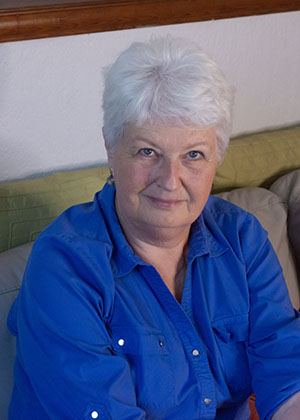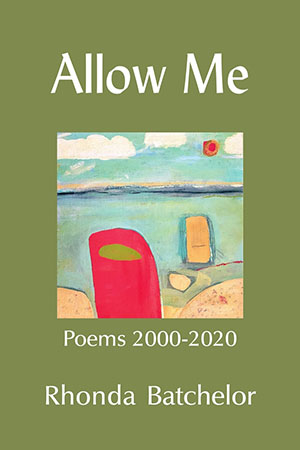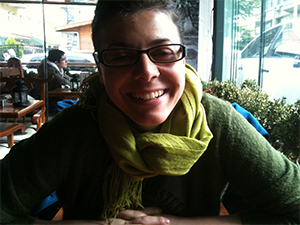Allow Me: Micaela Maftei in Conversation with Rhonda Batchelor

Rhonda Batchelor, who worked as Assistant Editor at The Malahat Review for 15 years, recently published Allow Me: Poems 2000-2020. She discusses resiliency, relationships, and writing about good, bad, and magically mundane life events in her Q & A with Fiction Board member and past interim editor Micaela Maftei.
Rhonda Batchelor is originally from Brantford, Ontario but moved to Vancouver Island to attend university and simply stayed. She has worked in and around publishing, as a writer, editor, publisher, bookseller, and consultant, since the 1970s. She and her late husband, the poet Charles Lillard, operated Reference West Press, publishing over 100 chapbooks by some of Canada’s finest writers. The accompanying readings, The Hawthorne Series, ran from 1990 to 2000. Her own poetry titles include Bearings (Brick Books), Interpreting Silence (Beach Holme), Weather Report (Dundurn Press) and Allow Me (Ekstasis Editions). She retired at the end of 2019 as a long-time assistant editor of The Malahat Review and lives in Oak Bay, a seaside community of Victoria, British Columbia.

The poems in this collection span 20 years—almost a generation! Can you talk a bit about the experience of gathering up poems over this period? How do you read new work and old work with the same kind of “eye” to try and weave together a collection? Is that even possible? What was the process like of working with material spanning this length of time and trying to see it as a potential collection?
First of all, I guess it’s obvious that I am not (nor have I ever been) a prolific poet! Even though this is my fourth full-length collection, the fact that two decades have somehow whizzed past since my last book of poems certainly speaks to my rather “occasional” approach. I tend to write in reaction to certain events in my life—be they good, bad, or magically mundane—when it seems a poem is the best way to respond and record. So I scribble away, revising and re-visiting as necessary, then file them and/or send them out for possible magazine publication. Slowly, very slowly in my case, the file gets a little thicker and one day you realize that maybe there’s a book there. Obviously, again, this is a very haphazard approach that doesn’t set out with a specific overarching theme. Working this way (and I don’t advise it) means you’re likely to end up, as I did, with what seems like an impossible jumble of disparate subjects, moods, and styles where the only unifying element is the author’s voice…and even that feels tenuous sometimes. But as you point out 20 years is a considerable span. For me it began with the years following my husband’s death when I found myself in a strange new widowed role, struggling to earn a living to support two kids. Somehow I did it, but work and financial stress were anathema to writing in general. I’d also hoped to meet another partner and that didn’t happen, although the unsuccessful attempts at least inspired a few poems.
Can you talk a little bit about the structure of the book overall? Are the four sections strictly chronological or were there other considerations as you decided how the book would fit together as a whole? I'm also curious here how you might have found/seen new connections between older poems when put into a new configuration (this collection).
At first I got hung up thinking the poems should appear in chronological order because that was my lived experience of them, but once I got over that mental block (with advice from a couple of wise poet friends) it freed me to agonize over other perceived problems. Would readers be able to differentiate poems about my late husband from those about another relationship, for example. I worried that a poem set in winter shouldn’t follow a poem set in spring. Some poems tried for a humorous touch, so perhaps they shouldn’t sit alongside the more serious ones. These are not unique problems, I’m sure, for anyone who’s tried to arrange a manuscript. Also, I’d had feedback from a publisher who told me there was a “sameness” to some of the poems, so I grappled with that, trying to understand what they were seeing/hearing that I wasn’t. I thought if I moved poems around it might break up whatever echoes there were, rather like shuffling cards. The four sections were an indirect result of this. Each numbered section contains a representative selection of the kinds of poems I write while still organically moving the narrative forward. In this way, strangely, a chronology somehow ended up being there anyway; a poem I may have written 20 years ago (like “Imperfect”) fits beautifully near the end of the book because it continues to feel relative today. Originally, it was simply about the wish for a romantic partner, but now that I’m a “senior” single I read it as one who really does require “…a hand to hold / on the homeward walk.” It’s pretty sobering, really.
Can you describe your writing process generally? Has it changed/developed over the years? Can you name any particular people/poets that have inspired your own writing?
I’ve always been a sporadic writer. Or maybe that’s not true. Certainly, when I was in my teens and twenties I devoted a lot of time filling journals and notebooks with my angst-filled musings. The best poems from my twenties appeared in Bearings (Brick Books, 1985), my first book. In my thirties, once I was a mom, writing felt like a sheer indulgence, yet remained something I absolutely had to steal time for. Curiously, this made those precious hours (or half hours) quite productive and Interpreting Silence (Beach Holme, 1994) was the result. Not too long after that, in the early spring of 1997, my husband died of cancer. Writing, much of it raw and unpublishable, once again got me through. The poems that were eventually published as Weather Report (Dundurn, 2000) were intensely personal, and yet people would come up to me after readings to tell me how much they connected with the work because they’d just lost a parent, or a friend. What I’m getting at here, I guess, is that I may be a sporadic writer but I write when I have to and in spite of (or because of) life’s circumstances. As far as poetic influences, that’s a long, long list…and even then I couldn’t differentiate influence from admiration. There are poets I admire without having a clue how to even try to do what they do. I will say I read primarily Canadian poets and connect with those who tend to reveal something of themselves, to open their hearts. I’m drawn to craft, but I dislike overt cleverness for its own sake.
One key theme that I see running through the collection is that of acceptance, or of seeing things as they are instead of how one might like them to be. I feel we can maybe best see this in a poem like “Room,” for instance, which closes the collection. Would you say that adapting to change, or coping with surprise (good or bad) is something you think about? It seems many of the poems trace what is left behind in the wake of different kinds of departures and how time can feel like it starts and stops depending on our circumstances. Can you talk a bit about these themes?
I find it intriguing (since I felt the book was such a miscellany) that you’re not the only one to perceive these threads. One of the cover blurbs says “the voice in this book is ultimately resilient” and another that the book is an “eyes-cracked meditation on time.” I’m flattered, but these weren’t things I consciously set out to accomplish! I think anyone who’s reached middle age (or older) has had to be resilient. I don’t think it’s a unique trait. We’re all faced with challenges—some of us more than others, be they physical, emotional, mental, financial, what have you, and for the most part we find ways of adapting, of coping. In the poem “Evelyn” I write about my mother’s dementia: “When my mother grew old, her mind grew young.” It’s not uncommon that people with dementia or Alzheimer’s retreat to the past. Apart from any medical aspect, I completely understand this from an aging poet’s stance. “I pine for the time / when I knew everything. / It was long ago, and spring—/ when the stars aligned and / I belonged. …” (“Once”) In a way, the poem “Room,” which you mentioned, was also about dementia. It was based on a dream of checking into a hotel having systematically lost my luggage, my money, my passport—in essence, my identity. It should have been a frightening scenario, and yet there was something comforting in having one’s circumstances reduced to a room where you are, at least for the time being, safe. Acceptance as resiliency? Maybe.
You have extensive experience reading, editing, and working with work by other poets—not just in your 15 years at The Malahat Review but also your earlier background publishing chapbooks. How would you say your editing work and your writing work co-existed?
It’s true I’ve worn a few hats over the years. My early editing work was pretty dry stuff, government reports, etc. In 1990 my husband Charles (Lillard) and I began to publish small chapbooks under the umbrella of our Reference West Press. These were poems and short stories by primarily local authors (and Victoria is blessed with more than its share) that represented their newest work, or work-in-progress. As such, they didn’t really require much editing other than assisting with the selection, the ordering, or what have you. The chapbooks were launched at monthly readings at the (now long-gone) Hawthorne Bookshop, where I was co-manager. Modestly produced and modestly priced chapbooks, served up with complimentary vin ordinaire in convivial surroundings, proved to be a winning combination, and the series ran for an astonishing 10 years. It was a privilege to publish so many wonderful writers, but even more of a privilege to hear and to really listen to words come alive. That was an education. I learned to always read my own lines aloud as I composed.
My tenure at The Malahat Review included about 13 years as a member of the poetry board where it was my pleasure (mostly!) to read literally thousands of submissions. It’s no easy task, but you soon learn to trust your instincts and your own visceral reactions. Your personal choices may get voted down by the rest of the board, but the discussions were always lively and, again, educational. My very smart colleagues were articulate and passionate and I learned so much from them as to what makes a poem work, or not work. The bottom line being that we all wanted only the best for our readers. Ultimately, however, on a personal level, my “dream job” at the magazine proved counterproductive to my own writing. Working on the frontlines of Canlit all day, getting other people into print, somehow curbed my enthusiasm, shall we say. Then, as reviews editor, it was sobering to see the sheer numbers of earnest “slim volumes” that arrived almost daily. I thought to myself, Why would I want to add another to this pile! Nevertheless, I did. And I have. Godspeed, little book. Godspeed.

Micaela Maftei
* * * * * * * *









